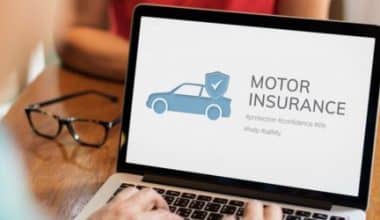Can you drive without insurance?
Well, nearly one in eight drivers do not have car insurance, according to a 2021 report from the Insurance Research Council. And if you are thinking about joining this not-so-exclusive club, DON’T!
It is a terrible idea.
Not only will you face legal consequences, such as fines and even jail time, but you’ll also face insurance consequences. And if you cause a car accident that results in property damage or injuries when you’re driving without car insurance, the financial fallout can be devastating.
Every state has some form of “financial responsibility” law. This means you must have a way to pay if you or someone driving your car causes an accident. One less-than-practical way to satisfy financial responsibility is to fork over a bond with the state that can run upwards of $50,000.
Why do this, though, when the easiest and most affordable way to satisfy financial responsibility is to buy car insurance?
Advantages of having auto insurance
Auto insurance offers a layer of protection for your assets. When you finance a car, your lender might require comprehensive and collision insurance as part of your loan contract. They want you to protect the automobile, which is their financial asset, with sufficient coverage.
You’ll want to protect yourself and your assets with enough coverage, as well. According to The Balance, industry professionals such as your state’s insurance commissioner recommend a minimum of $100,000 per person of bodily injury protection and $300,000 per accident.
Most at-fault car accidents cost far more than the minimum limits mandated by many states, such as California, where this limit is only $5000.
What is the least amount of car insurance I need?
Every state has its own requirements for what kind of car insurance residents should have and how much of it they should carry.
Nearly every state requires drivers to have some kind of liability insurance. Liability car insurance pays for others’ medical costs, lost wages and damage you cause in a traffic-related accident. It won’t pay for your own medical or car repair costs.
Depending on where you live, you may also have to pay for the following:
- Uninsured/underinsured motorist coverage. Pays for you and your passengers’ medical costs and car repairs when a driver with minimal or no car insurance hits you.
- Personal injury protection coverage, or PIP. Also known as “no-fault insurance,” PIP pays for you and your passengers’ medical expenses, wages lost, funeral costs and more, regardless of who is at fault.
- Medical payments coverage, or MedPay. This also reimburses you and your passengers for medical expenses regardless of fault.
Should I get more than just the bare minimum?
Paying for car insurance might feel like you’re throwing money away. This is especially true if you’ve never been in an accident. However, misfortune can strike at any time.
While cars are becoming safer to drive, fatalities from car-related accidents are on the rise, according to the most recent data from the National Highway Traffic Safety Administration. And just one car accident can turn into a major financial setback if you’re uninsured or underinsured.
Most state minimum requirements aren’t enough to cover all expenses from major car accidents. This means you’ll be the one to pay the remaining balance if you’re at fault.
Take note: If you leased or financed your vehicle, your lender likely requires you to have collision and comprehensive insurance on top of any state-mandated minimums. These coverage types pay for repairs or replacement of your own vehicle in case of an event outside your control.
Cover your net worth
Since you’re legally responsible for any accidents you cause while driving, you should get at least enough liability insurance to cover your net worth in the event of a lawsuit.
You can calculate your net worth by subtracting your total debt (mortgage, credit card balances and loans) from the value of all your assets (house, cars, cash in the bank and investment accounts).
If your net worth is low, it may be enough to have just your state’s mandated minimum car insurance requirements. But take note, most states don’t require you to purchase car insurance that reimburses you for your own medical or car expenses if you’re found at fault after an accident or experience some other mishap outside your control.
Consequences of driving without insurance
Legal consequences
Driving without insurance can land you in legal hot water. Here are some of the consequences you could face:
- Fines. If you get caught driving without car insurance, at the very least, you can expect a fine that can run anywhere from $100 to $1,500, depending on your state.
- Vehicle registration suspension or revocation. Driving without car insurance could mean losing your vehicle registration.
- License suspension. In some states, your license will be suspended and may not be reinstated until you get car insurance. In other states, the suspension can be more harsh. For example, if you don’t have car insurance and cause an accident in New York, you could lose your license for up to a year.
- Fees. If your license is suspended, registration revoked or your car is impounded, you will have to pay fees to resolve those problems.
- Vehicle impoundment. In some states, such as California, your vehicle could be impounded if you get caught driving without insurance.
- Jail time. Yes, driving without insurance can land you in jail. Most states won’t impose jail time for first-time offenders, but some do. For example, in Michigan, if you drive or allow someone to drive your uninsured car, or drive a car that you know does not have no-fault insurance, you could spend up to one year behind bars.
If you don’t learn your lesson the first time around, the legal consequences can get more severe. Second and subsequent offenses will typically result in stiffer penalties, including steep fines and an increased likelihood of facing jail time.
State penalties for driving without insurance
The penalty for driving without insurance is different in each state. The table below describes penalties for first-time offenses by state. Some state governments will even imprison people for driving without insurance.
| State | Finefor First Offense | Additional Penalties for First Offense | Jail Time |
|---|---|---|---|
| Alabama | $500 | Registration suspension until $200 reinstatement fee is paid | None |
| Alaska | $500 | License suspension for 90 days | None |
| Arizona | $500 | License and registration suspension for 90 days | None |
| Arkansas | $50 | Registration suspension until $20 reinstatement fee is paid | Up to one year |
| California | $100 | None | None |
| Colorado | $500 | License suspension until proof of insurance is provided | None |
| Connecticut | $100 | License and registration suspension for six months | Up to five years |
| Delaware | $1,500 | License suspension for six months | None |
| District of Columbia | $150 | License suspension for 30 days | None |
| Florida | $150 | License and registration suspension up to three years | None |
| Georgia | $85 | License and registration suspension for 60 days | Up to one year |
| Hawaii | $500 | License suspension until proof of insurance is provided | None |
| Idaho | $75 | None | None |
| Illinois | $500 | License suspension up to three months | None |
| Indiana | $250 | License suspension up to 90 days | None |
| Iowa | $250 | None | None |
| Kansas | $300 | License and registration suspension until proof of insurance is provided | Up to six months |
| Kentucky | $500 | Registration suspension up to one year | Up to 90 days |
| Louisiana | $500 | None | None |
| Maine | $100 | License and registration suspension until proof of insurance is provided | None |
| Maryland | $1,000 | None | Up to one year |
| Massachusetts | $500 | License and registration suspension for 60 days | Up to one year |
| Michigan | $200 | License suspension up to 30 days | Up to one year |
| Minnesota | $200 | License and registration suspension up to 30 days | None |
| Mississippi | $500 | License suspension up to one year | None |
| Missouri | $20 | License suspension until proof of insurance is provided | None |
| Montana | $250 | None | None |
| Nebraska | $100 | License suspension until proof of insurance is provided | None |
| Nevada | $250 | License suspension until proof of insurance is provided | None |
| New Hampshire | $125 | License and registration suspension until proof of insurance is provided | None |
| New Jersey | $300 | License suspension up to one year | None |
| New Mexico | $300 | License and registration suspension until proof of insurance is provided | Up to 90 days |
| New York | $150 | License and registration suspension until proof of insurance is provided | Up to 15 days |
| North Carolina | $50 | License suspension until proof of insurance is provided | None |
| North Dakota | $150 | License suspension until proof of insurance is provided | None |
| Ohio | Varies | License suspension until proof of insurance is provided | None |
| Oklahoma | $250 | License suspension until proof of insurance is provided | Up to 30 days |
| Oregon | $260 | License and registration suspension until proof of insurance is provided | None |
| Pennsylvania | $300 | License and registration suspension for three months | None |
| Rhode Island | $100 | License and registration suspension for three months | None |
| South Carolina | $550 | License suspension for 30 days | None |
| South Dakota | $100 | License suspension up to one year | Up to 30 days |
| Tennessee | $25 | License suspension until proof of insurance is provided | None |
| Texas | $175 | None | None |
| Utah | $400 | License suspension until proof of insurance is provided | None |
| Vermont | $250 | License suspension until proof of insurance is provided | None |
| Virginia | $500 | License suspension until proof of insurance is provided | None |
| Washington | $550 | None | None |
| West Virginia | $200 | License suspension up to 30 days | Up to one year |
| Wisconsin | $500 | None | None |
| Wyoming | $250 | License suspension until proof of insurance is provided | Up to six months |
Fines and penalties for subsequent offenses can be higher and include additional jail time in some states. There are also often reinstatement fees you can pay to get your license and registration re-validated.
Personal consequences
Driving without car insurance can also hit your wallet hard. Here are a few insurance consequences you might face:
- Higher auto insurance rates. If you drive without insurance, you’ll have what’s called a “coverage gap.” Insurers see drivers with a coverage gap as a higher risk to insure, which means you’ll be paying higher rates.
- Car repair bills. If you cause a car accident without insurance, you won’t have coverage for car repair bills for your own vehicle or the other driver’s vehicle, which means you could be personally on the hook to pay for major bills, especially if the accident results in a totaled car. And if you damage someone else’s property, like a fence, you’ll be paying for that, too.
- Medical expenses. If you cause an accident that results in injuries, you could be held liable for the medical bills. The average cost for a bodily injury claim in 2017 was $20,453, according to the National Association of Insurance Commissioners’ most recent report. If you don’t have the cash to pay up, you could be sued, putting your assets, savings and home at risk.
Where is it legal to drive without insurance?
If you live in one of the following states and meet the requirements, you can drive without insurance:
- Virginia: pay a yearly $500 fee to the Virginia Department of Motor Vehicles.
- Alaska: live in a remote area, as designated by Alaska’s Department of Administration.
If you don’t live in Virginia or the Alaskan wilderness, it may still be possible to drive without insurance if you can prove “financial responsibility” by submitting a bond, certificate of deposit or other cash deposit with your state. The dollar amount required varies; Florida requires a bond or cash deposit of $30,000 while Nebraska accepts a bond or certificate of deposit of $75,000.
New Hampshire also requires a large sum of money as proof of financial responsibility, but only after you’re found at-fault following an accident.
What happens if I get into an accident without insurance?
If you cause an accident and don’t have car insurance, you may have to pay for the damage out of your pocket. You could also get sued if you don’t pay.
Police will likely charge you with driving without car insurance. You could face a hefty fine, license suspension and even jail time, depending on the state.
Once you buy car insurance, you will probably pay much higher rates for coverage. The at-fault accident and not having coverage are two factors that generally mean higher car insurance costs.
These are all reasons why maintaining car insurance coverage is critical to your finances.
Tips to avoid penalties for driving without insurance
Driving without car insurance isn’t a wise decision. Here are some ways to make sure it doesn’t happen to you.
Pay your car insurance bill on time
You may lose coverage if you don’t pay your bills by the due date. Some insurance companies have a grace period so check with your insurer if you’re late on payment.
Make the payment promptly to avoid losing your coverage.
Be careful when changing car insurance companies
It can be wise to switch car insurance companies if you find a better rate, but make sure you go about things the right way.
One possible mistake when changing companies is not taking into account an insurance gap. Make sure your new policy is scheduled to take effect as soon as your old policy ends.
Let your insurer know if you no longer want coverage
If you’re changing companies, make sure to notify your current insurer. Stopping payments can lead to late fees and having your record show that you stopped paying.
Recommended Articles
- Third-Party Car Insurance: What Is It & How Does It Work?
- How To Check Car Insurance: The Ultimate Guide
- Car Insurance Renewal: How Does It Work?
- Car Insurance With No License: Can You Get It & How?
- What Is Liability Car Insurance: Meaning & What It Covers
- Does Car Insurance Cover Theft?






